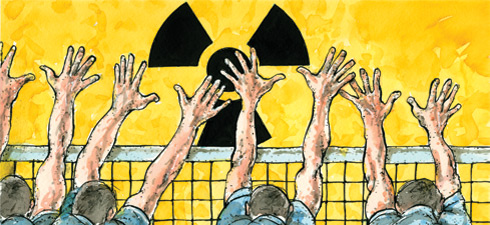What it’s missing: airbags, ESP, the catalytic converter, the halogen high-beams, the parking assistance, the power windows. Nobody would dream of refitting a 40-year-old VW Beetle to make it roadworthy in modern traffic, which is twice as heavy and far faster than it was the day the first Beetle hit the street. Very few drivers of our time would like to sit in the old crate to head off to work every day. And even for Sunday drives the Beetle of the early 1970s can hardly be regarded as a vintage car, as it’s not old or special enough.
Of course, a nuclear power plant is no car. It is far more complex, designed to work for 40 years, and, where possible and at plants run by operators with a high awareness of safety, it is continuously upgraded. Nevertheless, a nuclear power plant, such as the plants of the first generation of reactors developed in the EU in the 60s and hooked up to the grid in the 70s, does have something in common with a VW Beetle: the cost of modernising one to meet modern standards and be eligible for approval today is nowhere near reasonable. Like the Beetle, the old reactors deserve to end up on the scrapheap.
**This content has been removed under request of the copyright owner.**
From Brussels
Stress tests will lead to more expensive electricity
Most of the EU’s 134 nuclear reactors need upgrades to ensure their safety in face of cataclysmic events, said the European Commission, presenting its EU nuclear safety review in Brussels on 4 October. The cost of such improvements will range from €10 billion to €25 billion — “a bill that is likely to be passed on to the consumer in higher electricity prices,” writes the Daily Telegraph.
The London daily notes that the European Commission undertook its review according to the parameters of the earthquake and tsunami of March 2011 in earthquake-prone Japan, which killed 16,000 people and damaged the Fukushima nuclear plant. It adds that —
Guenther Oettinger, the European Energy Commissioner, who controversially described the Fukushima incident, which did not cause any deaths, as an ‘apocalypse’, said that safety standards in Europe were ‘generally high’.
The Commissioner nevertheless announced that he plans to introduce new EU legislation compelling the nuclear industry to take out liability insurance based on mainly theoretical risks of nuclear disaster, saying —
The obligation to have insurance cover will lead to costs that will be reflected in the cost to the consumer of buying electricity. Certainly this will not lead to nuclear energy becoming more competitive.
Was this article useful? If so we are delighted!
It is freely available because we believe that the right to free and independent information is essential for democracy. But this right is not guaranteed forever, and independence comes at a cost. We need your support in order to continue publishing independent, multilingual news for all Europeans.
Discover our subscription offers and their exclusive benefits and become a member of our community now!












